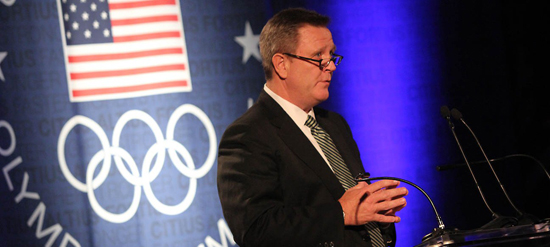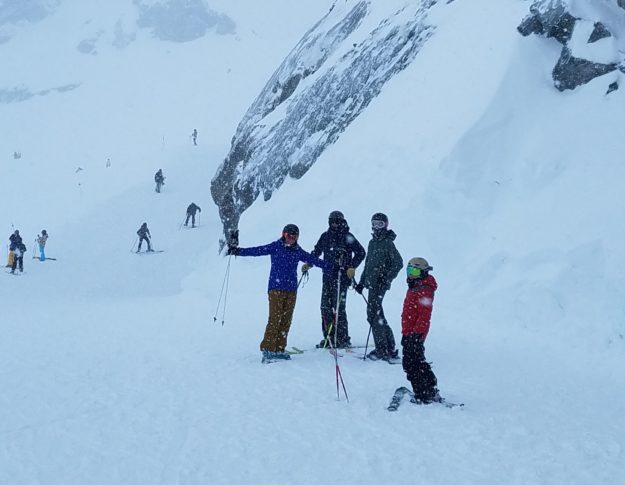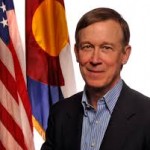Widgetized Section
Go to Admin » Appearance » Widgets » and move Gabfire Widget: Social into that MastheadOverlay zone
Winter Olympics seen as opportunity to promote Colorado’s progressive public lands, energy policies

United States Olympic Committee CEO Scott Blackmun (USOC photo).
North Korea and South Korea are holding talks about the North’s possible participation in next month’s Winter Olympic Games in Pyeongchang, South Korea, and President Donald Trump — despite previous tweets about the size of his nuclear button — now says those talks could be a “good thing.”
Trump also agreed to suspend joint military exercises with South Korea during next month’s Winter Games.
The roller coaster of political sparring between Trump and North Korean Supreme Leader Kim Jong-un might still derail the Olympic love-fest before the Games begin on Feb. 9, but one thing is quite clear. These will be some of the most politically fraught Games in modern Olympic history.
In thinking back on the last four Winter Olympics — three of which I attended as a member of the working press — there was nothing that compared to what has happened and what still might happen leading up to and during the Pyeongchang Games Feb. 9-25.
Salt Lake City had its bribery scandal and the tension of being the first Olympics after 9/11, Torino experienced similar terror concerns, Vancouver came in the depths of the Great Recession, and Sochi was a showcase for a repressive regime that institutionalized doping and later used the afterglow of the Games to invade neighboring Ukraine. But all of those things seem quaint compared to looming nuclear armageddon.
The idea that athletes should ignore it all and focus only on the competition is laughable.

Plenty of snow and dramatic terrain last week at Whistler-Blackcomb, host of the 2010 Winter Olympics (David O. Williams photo).
I recently returned from Whistler, British Columbia, where I hadn’t been back since the 2010 Vancouver Winter Games, and just eight years later there’s so little evidence of any real and lasting improvement to the local infrastructure that I once again wondered whether it’s really worth it for cities to pursue and host the Winter Olympics.
Does the fleeting fame and fortune warrant the billions of dollars in public expense? Whistler was famous as a destination ski resort before the Games – one coveted at the time by international ski conglomerate Vail Resorts – and it remains just as iconic now that it’s actually owned by the Broomfield, Colorado, company.
Similarly, Vancouver is one of my favorite North American cities. It was before the Olympics, and it remains so now. The Olympics really had nothing to do with the Canadian coastal city’s status, and, to me at least, Vancouver’s branding as the host of the “Green Games” rings a bit hollow eight years later in an increasingly warming world.
The train tracks along the greatly improved and expanded Sea to Sky Highway sit dormant, and travel to Whistler-Blackcomb seems about the same – as much dependent on weather conditions as any other factor. Could the so-called “Green Games” have left a more lasting legacy?
And what should Colorado hope to achieve if it decides to bid on the 2030 Winter Olympics? Could it use the Games to revamp its badly flagging infrastructure, especially on the transportation front? Or could the state reach even higher and hope to use an Olympic bid to spur a true transformation of its energy grid and outdated highway system, all the while pushing a progressive message of clean energy, mass transit and support for public lands and the outdoor recreation economy?
What if the United States took it even a step further and asked the International Olympic Committee to radically rethink its bidding process? For instance, the three American cities interested in hosting the Games –Reno-Tahoe, Denver and Salt Lake City – could put together a joint bid and seek to link all three regions using either existing rail or – better yet – something truly transformative such as the Hyperloop.
For the ski industry, getting cars off gridlocked winter roads should be the goal. And as we’ve seen yet again this season in all three regions interested in the Games, global climate change is changing the ski business. The two things are very much related. Why shouldn’t the Olympic Games be a platform to start addressing both problems in the western United States?
Experts on all of these topics tried to answer some of these questions in an article I wrote in mid-December that published in Colorado Politics on Jan. 1. Here’s that story:
Politics at forefront of upcoming Winter Olympics
But for snow sports industry, biggest issue is climate change
By David O. Williams
VAIL, Colo. – Snow sports – and the ultimate competitive form of them, the Olympics – are supposed to be apolitical, right? If NBA superstar Michael Jordan had been a snow skier, he might have said, “Republicans buy skis, too” – if in fact he ever really uttered his infamous line about sneakers.
But the reality is, from the raised, black-power fists of Tommie Smith and John Carlos at the 1968 Summer Olympics in Mexico City to the Palestinian terror attack against Israeli athletes at the Munich Games in 1972 to the dueling boycotts by the United States and the Soviet Union of the 1980 and ’84 Summer Games after the USSR invaded Afghanistan, politics have played a major role in the modern history of the Olympic movement.
Now the bellicose rocket rattling by the U.S. and North Korea on the Korean Peninsula threatens to overshadow the Pyeongchang Winter Games, set for Feb. 9-25 in northeastern South Korea, just 50 miles from one of the most tensely militarized borders in the world – the ironically named Demilitarized Zone (DMZ) between North and South Korea.
United Nations Ambassador Nikki Haley recently went so far as to suggest the United States might not send a team to Pyeongchang, although she later clarified the U.S. won’t boycott the Games but is keeping a very close eye on the security situation. That prompted several questions on a recent call with United States Olympic Committee CEO Scott Blackmun.
“We were obviously a little bit surprised, but not at all surprised when at the end of the day there was just some miscommunication rather than anything that was intended to be substantive and send a message,” Blackmun said of Haley’s comments. “Yes, it definitely got our attention, but all’s well that ends well, and it was just a little bit of an oversight in terms of language.”
So, the Games will go on – for the U.S. team, at least – but what if things escalate before February? And does the Trump administration have the authority to pull the plug on the Games the way President Jimmy Carter did when he boycotted the 1980 Moscow Olympics?
“We’ll leave that to the constitutional lawyers,” Blackmun said. “We are going to take a team to Pyeongchang unless it’s physically impossible, or legally impossible. We are 100 percent committed to our athletes on that but don’t want to get into a discussion around what the legalities might be.”
To calm frayed nerves, South Korean President Moon Jae-in has been pushing for a cessation of joint-U.S. war games ahead of the Olympic Games, and Blackmun says American athletes, media partners and corporate sponsors do not appear overly concerned about an escalation.
“In all candor, I have not gotten a single comment from an athlete or a single comment from a sponsor,” Blackmun said. “Everybody is focused on the fact that we’re going to be bringing a team. We’re going to show up like almost a hundred other nations and are really looking forward to it.”
First post-Trump Olympics
Of more concern for some athletes, apparently, is how the U.S. team will be greeted by those other nations. One of the likely faces of the Games on NBC, U.S. ski-racing superstar Lindsey Vonn of Vail, jumped into the political fray with a recent interview on CNN in which she said she hoped to “represent the people of the United States, not the president.”
She then sought to clarify her remarks on President Donald Trump with an Instagram post in which she detailed some of the backlash she’s received, including from people who said God was punishing her with a recent back injury and that they hoped she would break her neck.

Lindsey Vonn (Getty Images/Agence Zoom-Christophe Pallot).
“All Olympic athletes represent their nation as a whole, and are not representatives of their government or any specific political figure or party,” Vonn wrote. “None of us work tirelessly for years on end to compete in the Olympics on behalf of Democrats or Republicans. The Olympics are a non-political event …”
Of course, they’re not, really, and U.S. policy both domestically and overseas has long been a target for international critics. Vonn says that’s intensified since the election of Trump.
“I am proud to be an American, and I want our country to continue to be a symbol of hope, compassion, inclusion and world unity. My travels around the world have recently made clear that this is no longer how people view the United States,” said Vonn, who is by most measures the best female ski racer in the history of the sport.
Pyeongchang will likely be the last Olympic Games for the 33-year-old Vonn, who will be 37 when Beijing becomes the first city to host both the Summer Olympics (2008) and the Winter Games in 2022. But she’s repeatedly said she’d love to see the Olympics in her adopted home state of Colorado.
Blackmun says the USOC is leaning more toward making a bid for the 2030 Winter Games than 2026, which requires cities to express interest in making a bid by March 31. Los Angeles will host the 2028 Summer Olympics after Paris in 2024.
Blackmun added that Denver, Reno-Tahoe and Salt Lake City have all “engaged in dialogue” with the International Olympic Committee. Denver Mayor Michael Hancock and Colorado Gov. John Hickenlooper recently announced the formation of a 36-member Olympic exploratory committee to assess the state’s appetite for taking another stab at hosting the Games.

Gov. John Hickenlooper
“I look forward to hearing more about that possibility from the exploratory committee,” Hickenlooper said in a release. “An event of this magnitude requires that communities come together to collaborate. That’s our sweet spot in the Centennial State.”
Ski resort operators also are interested in the idea of bringing the Games back to Colorado after they were awarded to Denver in 1970 only to have voters reject funding for them in 1972. Beaver Creek was developed as a venue for those failed 1976 Denver Winter Olympics.
“We will participate and coordinate with [Denver] on its exploration into potentially pursuing a bid and expect that multiple of our resorts would be considered as venues,” said Chris Jarnot, Vail Resorts Executive Vice President, Mountain Division. “Our understanding is that cities in other regions where we have resorts may also consider pursuing bids, and we will participate with them as well.” Vail also owns ski areas in Park City, Utah and the Lake Tahoe area.
Climate activism in skiing
While political controversy has for decades swirled around the Olympics, it’s primarily a Summer Games thing. These Winter Games will be the first in the Trump Era, and athletes and even corporations in the snow sports industry seem emboldened to speak out on topics from immigration to climate change.

Bode Miller in Vail last month (David O. Williams photo).
Arguably the greatest male ski racer in U.S. history, New Hampshire’s Bode Miller has retired and won’t be racing at Pyeongchang, but he will have an outsized presence as a ski-racing commentator on NBC. A partner in Bomber Ski, Miller recently told Colorado Politics that climate change – still a largely partisan issue in this country — is transforming the ski business.
“I’ve seen it now a lot. Everyone’s bitching about the last few years,” Miller said of warmer, drier winters that have compressed the ski season. “That’s the tip of the iceberg. It’s going to continue to be an issue.”
Everyone in snow sports, seemingly — from the U.S. Ski and Snowboard team in October to snowboarding and clothing manufacturer Burton to Vail Resorts with its “Epic Promise for a Zero Footprint” in July to Aspen Skiing Company for many years in many ways — is getting onboard the climate-action bandwagon.
Recently, the Climate Action Collaborative for the Eagle County Community met with the new CEO of the local electric coop, Holy Cross Energy, and talked about ways to meet the group’s goals of reducing greenhouse gas emissions 80 percent by 2050. The group has 17 signatures on letters of intent, including from the town of Vail, Vail Resorts and Holy Cross.
Asked how important such local efforts are given the change in direction on climate issues at the federal level, Vail Town Council member Kim Langmaid, who’s spearheading the Climate Action Collaborative (pdf), said, “It’s critical. It’s the only hope we have.”
Also the vice president, director of sustainability and founder of Walking Mountains Science Center in Avon, Langmaid says immediate and dramatic action is imperative for the survival of the ski industry and the preservation of Colorado’s mountain environment.

Kim Langmaid
“There is a much greater urgency now,” Langmaid said. “We know in our region we’ve lost almost a month of freezing days, and so yes, the ski season is shortening, and the science of climate change, we know what’s happening, we know what the reasons are, we’re over it, and at the risk of offending guests, I think it’s the most important thing that ski areas need to do now.”
As far as the Olympics go, Langmaid says the Games need to get much greener, especially if Colorado is serious about bidding on either the 2026 or 2030 Winter Olympics.
“It would be awesome to host if it could be a catalyst and it could commit to being a zero-waste event that would leave us better off in terms of the environmental footprint going into the future than we are now,” Langmaid said, adding that, with or without the Olympics, often-bottlenecked Interstate 70 into the mountains needs to be fixed and vehicle miles must be reduced.
“It is the number one thing that we need to focus on actually, when we think about climate change and reducing our fossil-fuel dependence,” Langmaid said. But she doubts mass transit into the mountains can be a reality in the mere eight years before 2026. “They need to start working on that pretty fast if that’s going to happen.”
Basalt Town Council member Auden Schendler, who’s also vice president of sustainability for the Aspen Skiing Company, says it would be nice if the International Olympic Committee would stop accepting bids from coastal resort regions like Vancouver, Sochi and Pyeongchang.

Auden Schendler
“The context is that we’ve seen the last two Winter Games have been terrible snow conditions, and we’re going to have another one. South Korea is going to be terrible,” said Schendler, who feels the Olympics should be a platform for educating people about climate change.
“The Olympics, like everyone else, are totally missing the point, which is that you have this international platform from which you could change minds, recruit corporations and drive real action on climate if you talked about it,” said Schendler, who consulted for the 2010 Vancouver Olympics. “And instead, Vancouver’s a great example, they build a village where they try to make it as green as possible, or they do composting and recycling. I mean, give me a break.”
The media relations team for the IOC responded that the organization developed a protocol for incorporating sustainability into the future of the Olympic Games.
“Olympic Agenda 2020, which is the strategic roadmap for the future of the Olympic Movement. places great emphasis on incorporating sustainability in all aspects of the Olympic Games,” IOC officials said in an email statement.
“Recommendation 2 of Agenda 2020 calls for the evaluation of candidate cities to present a more explicit risk and opportunity assessment with a strong focus on sustainability and legacy, and this was reflected in the reports from the commission evaluating the candidate cities for the Olympic Games 2024 and 2028,” IOC officials added.
Olympics as a catalyst?
Schendler isn’t being consulted on Colorado efforts to land the 2026 or 2030 Games, but he has strong opinions on what such a bid should look like, including getting cars off the roads between Colorado’s Front Range and its mountain resorts.
“What if you said, ‘We’re going to have the Games. We’re going to host them at a mountain midway between Denver and Utah, and we’re going to use it as a way to build a train’?” Schendler said. “It would be a pretty amazing thing to use the Games to catapult economic and environmental development, versus just fire-hosing communities with wasteful development.”
That sentiment pretty closely echoes former Democratic Gov. Dick Lamm, who as a state legislator led the charge against the 1976 Denver Olympics that were awarded by the IOC in 1970 but shot down two years later by Colorado voters who refused to spend tax dollars.
Now teaching public policy at the University of Denver, Lamm in 2014 told the Rocky Mountain Post he wouldn’t necessarily object to a future Colorado Olympic bid – which he helped derail in the 70s over financial and environment concerns – but that the Games need to be massively restructured following the $50 billion price tag of Sochi, and should include a fix for I-70.
“We have a bottleneck in Interstate 70 going up to the mountains; it can’t be expanded,” Lamm said after Sochi, which included a new train. “Just simply the Balkanized nature of the Olympics promised all kinds of logistical problems [in 1976], but we are a much more sophisticated state at this time. It’s an expense problem, but I think we can engineer our way around that bottleneck.”
Pyeonchang also got a shiny new bullet train up from Seoul, but such things cost big bucks, and a CDOT-funded study in 2010 put the cost of a high-speed passenger train from Denver International Airport to the Eagle County Regional Airport near Vail at $16 billion. Russia reportedly spent nearly $9 billion on its train between Sochi and the mountain resorts — far more than the total of $6.4 billion spent on the entire 2010 Vancouver Winter Olympics.
By contrast, the train between Vancouver and Whistler was shut down prior to those Games, in favor of a major expansion of the Sea to Sky Highway.
“Even if they had created a train, that’s totally missing the point,” Schendler said. “The point isn’t let’s lessen the impact of the Games by 20 percent and declare victory – and it would be pretty big to do that. No, use the Games as a megaphone to talk about the most important issue of our time. That would be it.”
IOC officials said such considerations will be front and center for future Winter Olympic bids.
“The 2026 Candidature Process is also a direct result of this new approach to enable cities and National Olympic Committees (NOCs) to have even more sustainable, feasible and cost-effective Olympic Winter Games, and to align with their local, regional and national long-term development goals,” IOC officials told Colorado Politics.
Aspen’s Schendler says Colorado and its business community is leading on public lands, luring the Outdoor Retailer Show away from Salt Lake City by having more progressive policies for preserving federally-owned public lands. But he says outdoor retailers have been far more reluctant to jump into the debate over climate change.
“That would be the obvious thing to do in terms of recruiting the Olympics, which is to say, ‘We’re progressive not just on land but on climate,’ and really sell the state that way,” Schendler said. “Then use the Olympics as a way to not just promote the state’s clean energy work but get the Olympics on board in talking about this issue.”
David O. Williams
Latest posts by David O. Williams (see all)
- Neguse, Bennet call for halt to BLM emergency rule aimed at increasing Utah oil-train traffic - June 23, 2025
- The O. Zone: Trump’s long list of broken campaign promises just jumped to yet another forever war - June 23, 2025
- The O. Zone: Coming to Vail this summer? Leave fireworks, risky fire behavior at home - June 20, 2025


